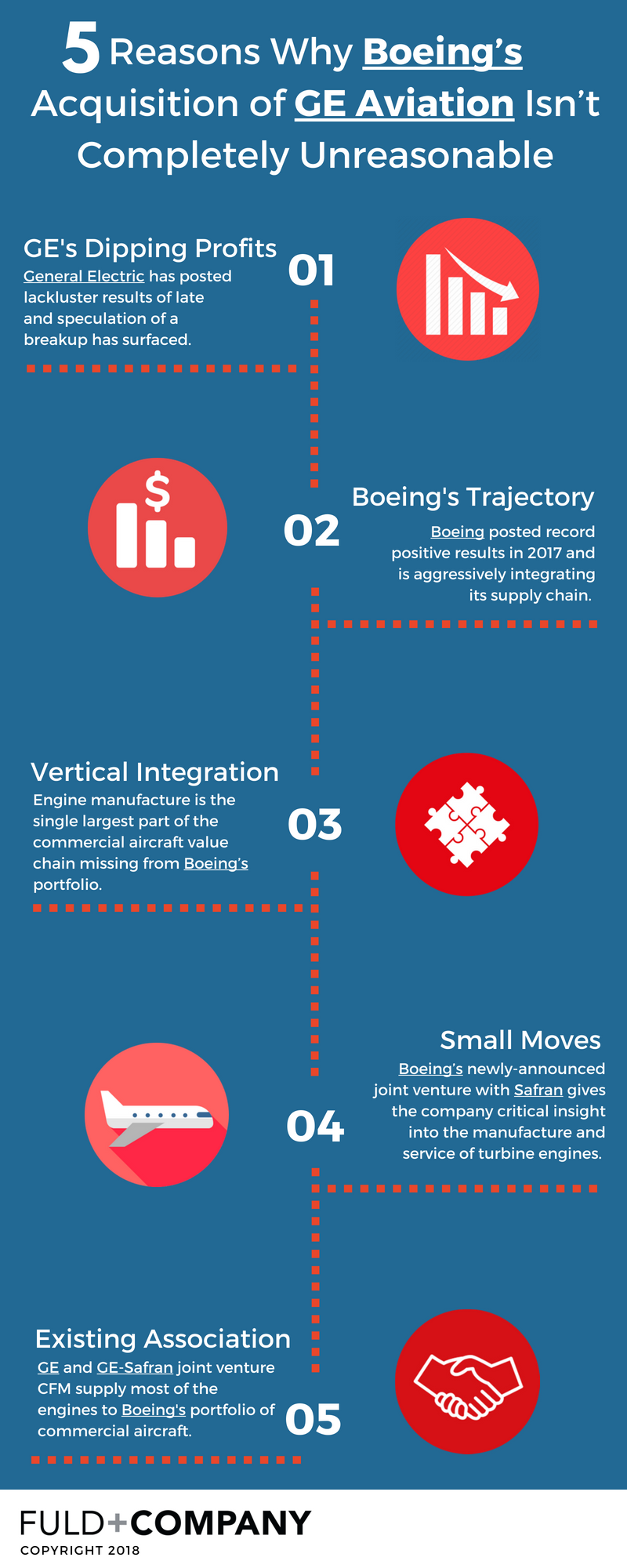Why Boeing’s Acquisition of General Electric Aviation Isn’t Completely Unreasonable (Part 1).
Posted by | Christopher Dent
The first part of this year saw a flurry of speculation[i][x] on whether commercial aircraft giant Boeing should acquire General Electric Corporation’s Aviation Unit. GE posted lackluster results for 2017[ii] prompting many to wonder if the venerable conglomerate had lost its way and should be broken up[iii][iv]. Coupled with the removal of GE from the Dow Jones effective June 2018, GE probably feels the pressure.
Meanwhile the Boeing Company had a very strong performance in 2017[v] and looks near-unstoppable for the foreseeable future. During the first half of 2018, the company made several moves to increase its vertical integration, entering joint ventures for aircraft interiors[vi] and auxiliary power units[vii][viii]. Further, the company purchased parts manufacturer KLX for $3.25-billion[ix], integrating them into an aftermarket portfolio that already includes parts & service supplier Aviallacquired by Boeing in 2006.
Boeing participates in a number of stages of the commercial airfcraft value chain – from aircraft design, airframe manufacture, aftermarket service and support, training, and digital analytics. This, combined with Boeing’s recent moves, demonstrates the goal to control the commercial aircraft value chain from factory to flight line, part of Chairman and CEO Dennis Muilenberg’s One Boeing[xi] vision.
The engines that power commercial aircraft are extraordinarily complex, very expensive, and significantly influence the operating costs of the aircraft. Aircraft manufacturers, including Boeing, routinely offer multiple engine options for their products. As with the airframes themselves, the manufacture and aftermarket support for aircraft engines is big business. However, in the modern era, airframe and engine manufacturers operate independently. Boeing’s acquisition of GE Aviation would fundamentally change the commercial aircraft value chain to an unprecedented degree. Such foundational shifts in multi-billion-dollar industries don’t happen every day, so let’s look at some of the factors that make Boeing’s acquisition of GE not so far-fetched.
Reasons Boeing’s Acquisition of GE is Logical and Could Happen
- Boeing already uses GE engines on nearly every commercial aircraft they build[xii]. Boeing installs GE engines on its 747, 767, 777 and 787 families of aircraft. Boeing’s mainstay 737 family of aircraft uses engines made by CFM International, a joint venture between GE and Safran – the same Safran launched a joint venture with Boeing to produce auxiliary power units (APU).
- Boeing’s APU joint venture with Safran gives them a toehold in the engine industry. The auxiliary power units installed on modern commercial aircraft are in essence small jet engines that convert their output into electricity rather than thrust. These small engines provide ground power to the aircraft for lighting, main engine start, air conditioning and myriad other functions. In essence, Boeing just entered into a joint venture that makes and services small jet engines[xiii][xiv].
- What about other jet engine manufacturers? Boeing does list GE arch-rival Rolls Royce as an engine option for their 787 family of aircraft [xv]. Further, GE supplies engines for Airbus’ A330 family of aircraft. On Airbus’ A380 family of superjumbo aircraft, the company offers products build by Engine Alliance in which GE owns a 50% stake [xvi]. Clearly Boeing and GE would need to deconflict some relationships with Rolls Royce and Airbus, were an acquisition to take place. However, the primacy of GE within Boeing’s product portfolio and the relatively minor role played by GE in Airbus’ fleet places this within the realm of possibility.

Strategic Conditions for the Boeing/GE Acquisition
We also evaluated the two companies’ current market footprints, which have contributed to setting the stage for this acquisition:
- General Electric has posted lackluster results of late and speculation of a breakup has surfaced.
- Boeing posted record positive results in 2017 and is aggressively integrating their supply chain.
- Engine manufacture is the single largest part of the commercial aircraft value chain missing from Boeing’s portfolio.
- Boeing’s newly-announced APU joint venture with Safran gives the company critical insight into the manufacture and service of turbine engines.
- GE and GE-Safran joint venture CFM supply most of the engines to Boeing portfolio of commercial aircraft. GE and Safran play a comparatively smaller role in the operations of Boeing nemesis Airbus.
An acquisition of GE Aviation by Boeing may not be the most appealing deal to GE considering in grand scheme of performance, the aviation unit excelled amid poor performance for the rest of the business[xvii]. However, if this deal were to happen, the sheer scale of the disruption resulting from such transaction makes planning for this scenario prudent. Part of any scenario planning process is developing an early warning framework through which an organization can identify and watch for the indications of an impending disruption.
Resources:
[i] https://www.barrons.com/articles/should-boeing-buy-ge-aviation-1519223635, https://seekingalpha.com/news/3332756-boeing-dream-big-consider-ge-aviation-analyst-says, [ii] https://www.bloomberg.com/news/articles/2018-04-13/ge-s-2017-loss-widens-as-results-restated-after-accounting-shift [iii] https://www.cbsnews.com/news/ge-breakup-suggested-during-earnings-call/ [iv] https://www.cnbc.com/2018/01/16/ge-break-up-announcement-to-occur-as-early-as-this-spring-sources.html [v] http://investors.boeing.com/investors/investor-news/press-release-details/2018/Boeing-Reports-Record-2017-Results-and-Provides-2018-Guidance/default.aspx [vi] https://www.bloomberg.com/news/articles/2018-01-16/boeing-creates-seat-making-venture-to-cope-with-tardy-suppliers [vii] https://www.globalbankingandfinance.com/boeing-safran-agree-to-design-build-and-service-auxiliary-power-units/ [viii] https://www.thestreet.com/investing/stocks/boeing-deals-latest-blow-in-war-with-airbus-14610052 [ix] https://www.bloomberg.com/news/articles/2018-05-01/boeing-to-buy-aircraft-parts-supplier-klx-in-4-25-billion-deal [x] http://boeing.mediaroom.com/2006-05-01-Boeing-to-Acquire-Aviall-to-Enhance-Its-Growing-Services-Businesses [xi] http://www.boeing.com/media/speeches/2017-shareholder-address.page [xii] http://www.boeing.com/commercial/ [xiii] http://www.boeing.com/commercial/737max/ [xiv] http://www.boeing.com/commercial/737ng/ [xv] http://www.boeing.com/commercial/787/ [xvi] http://www.modernairliners.com/airbus-a380/airbus-a380-specs/ [xvii] https://www.ge.com/investor-relations/sites/default/files/GE_ISR2017.pdfTags: Aerospace & Defense, Disruption, Mergers & Acquisition, Other Industries




















